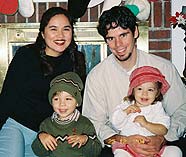In Catholic circles, there’s one group that is much maligned and little appreciated. But it’s a group that I have been blessed to work and pray with for many years. They are some of God’s most inspiring friends who get from our church neither a lifetime of employment security nor the status of ordination, but who don’t do this work for money or power anyway. They do it for love.
They are Catholics under 30. Here are some of the things they are doing right.
Service 101
Despite the demands of increasing tuitions, rising debt burdens, and heavy class loads, countless university students are still giving incredible service to the church and the world.
I work as a university minister at Loyola University Chicago, where we are graced with a vibrant liturgical life and transformative social justice programs.
Imagine 600 students in a standing-room-only chapel for Sunday Eucharist, beginning student-style at 10 p.m. After Communion, the congregation blesses 90 students who will spend their spring break on alternative break immersion trips. They are sent to build houses in Appalachia; serve meals in Baltimore; demonstrate for peace in Washington; pray with the Lakota people of Rosebud, South Dakota; and listen to the stories of the unemployed in Camden, New Jersey.
These 90 students actually had to be selected for those trips. Nearly twice as many students applied as we were able to send. It is a beautiful sight to see: All of these young men and women clad in their matching bright green T-shirts, standing around the altar, a visible sign of God’s presence and love.
Of course, this scene is not unique to Loyola. Boston College sends nearly 150 students on international trips each year. Notre Dame’s well-known summer project works with 200 community organizations around the country to provide 8- to 10-week service-learning internships to their students. Most Catholic universities and many Newman Centers around the country have similar programs.
For many students, these short-term experiences launch an even deeper commitment to gospel love and Christian friendship. Some of these students are so profoundly challenged that they become the teachers and evangelizers of their institutions. A few years ago, for instance, a group of Loyola students began urging the university community to befriend impoverished coffee farmers of Latin America. These students insisted that we First World consumers could and should pay a living wage to the families around the globe who produce the drink we have the luxury to enjoy. Their insistent voice brought a fair-trade coffee contract to Loyola. Now farmers who produce the coffee we drink at Loyola are guaranteed a minimum price of $1.26 per pound of coffee, while the free market bears the starvation wage of 54 cents per pound.
A “new novitiate”
In 1973 Dominican Sister Marcella Connelly returned to the United States from her mission in Bolivia with a fresh vision. Reflecting on her life of prayer, community, and service to the poor of South America, Connelly imagined a new partnership of sisters and young people.
The work she was doing, Connelly concluded, did not need to be limited to religious women. It was apostolic—that is, it was about being sent by Jesus to proclaim the reign of God. And all Christians, Connelly realized, were by their Baptism sent into the world by Christ.
So when she returned home, she and her congregation began inviting graduates of what was then known as Rosary College in River Forest, Illinois into their homes and ministries. Young women and men were invited to share in the apostolic life: They would teach in inner-city schools, staff shelters for the homeless, direct youth programs in poor parishes, or provide nursing care in rural health clinics. They would live communally on small stipends and pray regularly together. Though the Apostolic Volunteers (now known as Dominican Volunteers USA) lived and worked alongside the sisters, this was never meant as a recruiting program for the convent. Rather, it was the beginning of a new future for laypeople in the church.
When Connelly founded the Apostolic Volunteers, there were only about 20 other programs like it around. The Jesuits had been recruiting laypeople to help teach in their Alaskan schools for about 20 years. Edwina Gateley was bringing young European laypeople on mission to Africa. Father Ralph Beiting invited friends to share in his outreach ministry to the people of Appalachian Kentucky.  But in the past 30 years the vision of Connelly and her colleagues caught on with post-Vatican II Catholics. Now more than 200 Catholic programs are placing laypeople, the overwhelming majority of whom are under 30, into full-time, faith-based volunteer service around the United States and abroad. These volunteers typically spend one or two years living and working with poor and marginalized communities, learning about the social injustices that create poverty, praying over their joys and hardships, living in voluntary simplicity, and trying to build friendships based on gospel love.
But in the past 30 years the vision of Connelly and her colleagues caught on with post-Vatican II Catholics. Now more than 200 Catholic programs are placing laypeople, the overwhelming majority of whom are under 30, into full-time, faith-based volunteer service around the United States and abroad. These volunteers typically spend one or two years living and working with poor and marginalized communities, learning about the social injustices that create poverty, praying over their joys and hardships, living in voluntary simplicity, and trying to build friendships based on gospel love.
I call these programs the “new novitiate” because, like the traditional preparation for religious life, lay volunteer programs are an intense form of training for lifelong commitment to the mission of Jesus. They are now a major cultivating ground for professional lay ministers in the church and for workers in faith-based movements for social justice.
Consider this: In the year 2000, 500 new priests were ordained and 700 women entered religious life in the U.S. That same year 3,600 young people completed at least one year of service in a lay volunteer or missioner program. Tens of thousands of graduates of these programs are out in the world now.
Tom Gaunt, S.J. concluded from his study of 1,400 former members of the Jesuit Volunteers Corps (JVC) that “the one (or two) year experience of JVC produces more ‘influential people’ in a person’s life than family, school, workplace, church, or any other relationship.” As any former Jesuit Volunteer will tell you, they’re “ruined for life.” Gaunt’s results could undoubtedly be duplicated in other lay volunteer programs. Rooted in Christ’s self-sacrificing love, grown in a community of friends, the experience of lay volunteers bears fruit that lasts. It is perhaps the formative experience of their adult lives. It influences their decisions regarding faith, work, family, money, and politics. These experiences allow a new generation of Catholic leaders to practice living in the reign of God.
The effects are great—not only on them, but on the church and the world as well. By way of illustration, the Alliance for Catholic Education, whose members teach in underserved Catholic schools in the South, reports that 75 percent of its graduates remain in education after completing the program. Catholic Network of Volunteer Service member programs send about 200 young adults on to graduate study in ministry or theology every year.
These programs capture the spirit of our age. They give young adults the opportunity to deepen their faith, knowledge, and commitment. They nurture them on a path toward ministry, respecting the vocation to which they feel called. They provide a way to lay down their lives in service of the reign of God.
Expanding lay ministry
Thirty-five thousand lay men and mostly women are currently in professional-level formation for ministry in the United States. More than 10,000 of these are under 40. An estimated 100,000 lay ministers serve the U.S. church. Uncounted thousands trained for professional ministry in the church but have gone elsewhere because they found no place for themselves within the current structures.
Without the financial support of a religious community or its major donors, without the status of social recognition, without the least bit of job security, women and men are responding to the call of Christ for service in the church in growing numbers.
Since the Center for Applied Research in the Apostolate (CARA) first studied lay ministry formation in 1985-86, “the number of programs [preparing laypeople for professional ministry in the church] has expanded by more than 50 percent, and the number of participants in these programs has grown more than three-fold.” These faithful and courageous Catholics are laying down their lives. They are giving themselves to their friend—that is to say, the whole church.
Some are creating new ministries imagined freshly for our time. Some are serving in quite traditional roles, positions formerly occupied by the ordained or religious. They are parish administrators and hospital chaplains, liturgical musicians and theology teachers, writers and campus ministers. You know them.
They are career-changers like Mike Hayes of New York City who used his professional experience in the secular media to help create www.BustedHalo.com, a dynamic spirituality website for young adults. They are parish staff members like Karon Van Antwerp of Mt. Pleasant, Michigan, a vibrant 30-year-old pastoral associate with a gift for preaching and a wicked sense of humor. And they are artists like Dana Spottswood of Oakland, California, who created a new ministry painting beautiful icons of the saints for neighborhood parishes with her own homemade, earth-friendly paints.
Some in our church lament the passing of a day gone by or curse those who do not wish to re-create it. We need to stop pining for the past. We need to meet the resurrected Jesus and receive the gifts the Holy Spirit is offering us now.
A good place to start is in celebrating those who are already living into our imagined future. We can re-train our eyes to see the places where friendship, service, and life are growing. We can recognize those who have clearly been chosen for ministry in this time. We can acknowledge those whose lives are bearing fruit. These young people are not only the future of the church, but also its vibrant present.
Claire Noonan is the chaplain at Loyola University. This article appeared in the July 2005 (Volume 70; Number 7) issue of U.S. Catholic.



